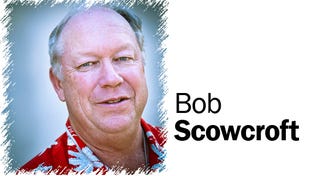Just 30 years ago, the term “organic” wasn’t yet part of the average American’s lexicon. Bob Scowcroft witnessed the organic industry’s growing pains and was a key advocate in the movement. He was a national organizer on pesticide issues for Friends of the Earth before being hired as the first executive director for California Certified Organic Farmers in late 1987. He and the CCOF board founded the Organic Farming Research Foundation in 1990, where he later served as executive director for 20 years.In this three-part series, he recounts some of the watershed moments in the organic movement. Read parts two and three here.
February 14, 2015

 This tale is about how five people, in a wonderfully unexpected manner, met each other and in an hour’s time decided to write an organic research act.
This tale is about how five people, in a wonderfully unexpected manner, met each other and in an hour’s time decided to write an organic research act.
In 1980, the USDA published the Report and Recommendations on Organic Farming written by a team led by political scientist Garth Youngberg from Southeast Missouri State. One of the recommendations in it suggested that the USDA establish a permanent organic resources coordinator position. At the end of the Carter administration, Youngberg was hired to fill that role.
Within months of the beginning of the Reagan administration, he and his secretary were fired. The new USDA secretary, John Block, ordered copies of the report destroyed under the belief that government should play no role in advancing organic research, nor developing information on organic practices.
Those moves caught the attention of a number of reporters, as well as several key nonprofit leaders who were fighting the application of toxic herbicides in our forests and pesticides on our farms, as well as a few of the businesses which were already selling organically labeled products and wanted more information about how to grow organic food. Most specifically, the Rodale family organized a conference titled the Cornucopia Project that brought forth environmentalists, progressive farmers, scientists and even a few USDA staffers for a retreat at their headquarters in Lehigh County, Pennsylvania.
That was in 1981. I had been invited to speak about my work at Friends of the Earth, organizing natural foods retailers to assist grassroots anti-pesticide groups in banning the applications of some of the suspected carcinogens out there. As at most conferences, we met in smaller breakout groups to identify actions that we were going to take and bring them back to the larger group. I went to my assigned spot in the “West” group, and there were three people there. The Lehigh group, meanwhile, had almost 600 people in it. Some breakout group! Because I had met Garth earlier in the year, I invited him and a Rodale staff person working in Washington, D.C., Sarah Ebenrech, to join our group and talk about his report.

Expo West appearance:
Organic Series: The People’s History of Organic
Thursday, March 5
10:30 - 11:30 p.m.
Marriott, Grand Ballroom G/H
The five of us introduced ourselves and talked about Garth’s dismissal, the Organic Task Force Report and how the secretary was making a very strong and public effort to bury it. It offered more than 20 recommendations that we thought the USDA should adopt to further the scientific understanding of organic farming systems. It was really the original document outlining an organic research agenda.
I had already had more than 1,000 natural food retailers (on 3x5 note cards!) filed in my store list. A gentleman named Sego Jackson was in my breakout group from Washington Tilth, and he was linked into the earliest organic certification network through Tilth. Another gentleman named Peter DeFazio (now a U.S. Congressman), who served on the field staff for a Eugene, Oregon, congressman named Jim Weaver, was also there. Of course Garth was the author of the report, and Sarah worked in Rodale Press' Washington office.
After some conversation on what we would report back to conference attendees, we looked at each other and said, why don’t we write an organic research act? We have the resources to do so among the five of us.
Remarkably, that came to pass. Congressman Weaver offered to co-sponsor it; Sarah said she would work Congress with Garth's support; I said I would organize a national grassroots campaign working with my FOE store network and reach out to environmental NGOs as well. Sego promised to reach out to as many emerging organic farming certification groups he could find for support too.
You May Also Like


